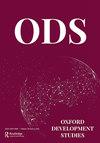Beyond ownership: women’s and men’s land rights in Sub-Saharan Africa
IF 1.2
Q3 DEVELOPMENT STUDIES
引用次数: 32
Abstract
ABSTRACT Advancing women’s land rights is a priority for the international development agenda. Little consensus exists, however, on which rights should be monitored and reported, especially in Sub-Saharan Africa where individual property rights and customary tenure regimes coexist and where much agricultural land remains unregistered. In such contexts, land ownership statistics may provide only a limited picture of women’s and men’s land rights. While some surveys collect information on women’s land ownership, others collect information on women’s management of land or control over the output produced. Using recent waves of the Living Standards Measurement Study-Integrated Surveys on Agriculture (LSMS-ISA) for six African countries, we examine who holds the different rights on each plot of agricultural land and the extent to which these rights are held by the same person. We focus on (a) reported ownership, (b) who decides and manages the agricultural activities, and (c) who controls the output of land. We find that these rights over land do not always overlap, indicating that concepts of ownership, management and economic rights should not be used interchangeably. Consistent measures of women’s and men’s land rights are fundamental for the development of policies to empower rural women and to contribute to poverty reduction.超越所有权:撒哈拉以南非洲妇女和男子的土地权
摘要:促进妇女的土地权利是国际发展议程的优先事项。然而,对于哪些权利应该得到监测和报告,人们几乎没有达成共识,尤其是在撒哈拉以南非洲,那里的个人财产权和习惯保有制度并存,许多农业用地仍然没有登记。在这种情况下,土地所有权统计数据可能只能有限地反映妇女和男子的土地权利。一些调查收集关于妇女土地所有权的信息,另一些调查则收集关于妇女管理土地或控制产出的信息。利用最近对六个非洲国家进行的生活水平衡量研究综合农业调查(LSMS-ISA),我们研究了谁在每一块农业用地上拥有不同的权利,以及同一个人在多大程度上拥有这些权利。我们关注(a)报告的所有权,(b)谁决定和管理农业活动,以及(c)谁控制土地产量。我们发现,这些土地权利并不总是重叠的,这表明所有权、管理权和经济权利的概念不应互换使用。对妇女和男子的土地权利采取一致的措施,对于制定赋予农村妇女权力和促进减贫的政策至关重要。
本文章由计算机程序翻译,如有差异,请以英文原文为准。
求助全文
约1分钟内获得全文
求助全文
来源期刊

Oxford Development Studies
DEVELOPMENT STUDIES-
CiteScore
2.70
自引率
0.00%
发文量
20
期刊介绍:
Oxford Development Studies is a multidisciplinary academic journal aimed at the student, research and policy-making community, which provides a forum for rigorous and critical analysis of conventional theories and policy issues in all aspects of development, and aims to contribute to new approaches. It covers a number of disciplines related to development, including economics, history, politics, anthropology and sociology, and will publish quantitative papers as well as surveys of literature.
 求助内容:
求助内容: 应助结果提醒方式:
应助结果提醒方式:


